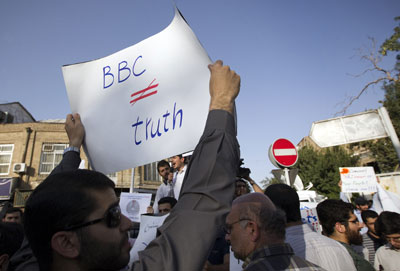New York, February 3, 2012–The Committee to Protect Journalists condemns the detention and harassment in Iran of relatives of BBC Persian service staff who work outside the country, which is part of a sustained campaign to intimidate journalists into not reporting critically on Tehran’s activities.
Last week, the sister of a BBC Persian service staffer was arrested and held in solitary confinement at Tehran’s Evin Prison on unspecified charges, the BBC said today. The sister has since been released on bail, the BBC said.
According to Human Rights Watch, the BBC employee in London was questioned online by a “man who claimed he was an interrogator at Tehran’s Evin Prison” and told that if the employee “cooperated and provided him with contacts and sources at the BBC, the authorities would free the detained family member,” who was held for close to two weeks.
“Iran’s government must immediately stop its harassment of the friends and family members of journalists,” said Mohamed Abdel Dayem, CPJ’s Middle East and North Africa Program Coordinator. “These attacks on journalists beyond Iran’s own borders show the lengths to which Tehran will go to intimidate the media into silence and deprive its constituents of information.”
In a statement posted online, the BBC said a number of relatives of staff at the Persian service have been temporarily detained and “urged to get their relatives in London to…stop working for the BBC.” Other tactics of harassment include the confiscation of passports of family members, preventing them from leaving the country.
Some staff have had their social media and email accounts hacked, the broadcaster said. That would not mark the first time that Iranian journalists have been targeted online; international media reported as early as 2009 that journalists were being harassed or impersonated via social networking sites. Interrogators compelled Newsweek reporter Maziar Bahari, who was imprisoned in 2009, to hand over his passwords, which were used to investigate his social network, CPJ research found. The Wall Street Journal reported in December 2009 that Omid Habibinia of the International Association of Iranian Journalists was being impersonated on Facebook by unknown parties, who attempted to connect and converse with his colleagues.
In October 2011, the BBC reported that relatives and friends of around 10 BBC staff members were arrested, questioned, or intimidated. In September, CPJ documented the arrest of six independent filmmakers whose critical documentary about Supreme Leader Ayatollah Ali Khamenei was aired on the BBC Persian service.
The regime’s campaign against the BBC extends to the repeated jamming of its broadcasts in Iran and false accusations of “sexual assault, drug trafficking, and criminal financial behavior” against the staff in the Iranian official media, according to the BBC.
The harassment comes amid 10 new arrests of journalists in January documented by CPJ. The country was holding 42 journalists behind bars when CPJ conducted its annual imprisoned census on December 1, 2011, making it the world’s worst jailer of journalists.
